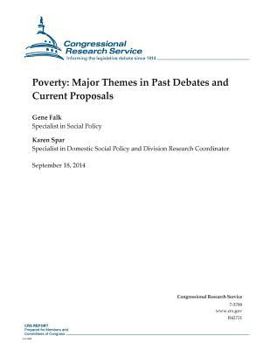Poverty: Major Themes in Past Debates and Current Proposals
This year marks the 50th anniversary of the War on Poverty, but poverty remains a difficult policychallenge. The Obama Administration and some in Congress have offered proposals that seek to address poverty, with the proposals differing considerably in their focus and content. However, the themes reflected in these proposals echo prior efforts to address the issue of poverty.The terms "poverty" and "welfare" (commonly thought of as cash assistance for the poor) are often intertwined, but federal policies affecting poverty are broader than a single program or set of programs. In fact, the social insurance program of Social Security may be the nation's most important antipoverty program. The incidence and character of poverty is affected by many facets of public life.Over the last century, several watershed events have affected federal policies for the poor. These include the enactment of the Social Security Act in 1935, creating the first federal social insurance and federal-state public assistance programs; President Johnson's War on Poverty launched in 1964 that sought to address the "causes, not just the consequences of poverty" and began a period of expansion of services and noncash benefits for the poor; the "welfare reform" debates that began in 1969 and lasted until the mid-1990s, as societal expectations for single mothers shifted from staying home with children to work; and the culmination of these debates in the mid-1990s with the twin policies of requiring parents receiving assistance to work and "making work pay" for low wage-earning parents. Most recently, the Affordable Care Act expanded health care coverage, particularly for lower-income persons.
Format:Paperback
Language:English
ISBN:1502507315
ISBN13:9781502507310
Release Date:September 2014
Publisher:Createspace Independent Publishing Platform
Length:36 Pages
Weight:0.24 lbs.
Dimensions:0.1" x 8.5" x 11.0"
Customer Reviews
0 rating





